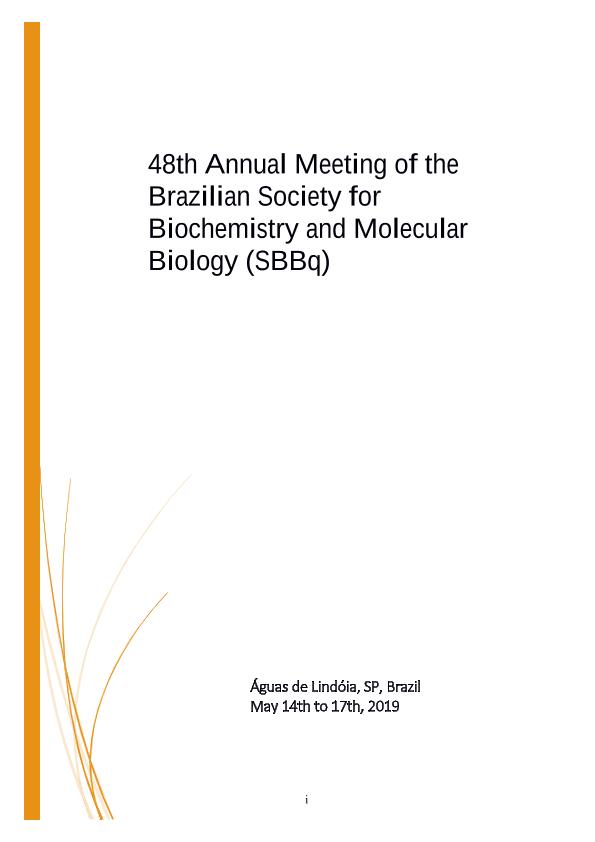Evento
CDC42 as an epigenetic regulator of ID4 in breast cancer
Colaboradores:
Gomes de Silva, Jeferson
Tipo del evento:
Reunión
Nombre del evento:
48th Annual Meeting of the Brazilian Society for Biochemistry and Molecular Biology
Fecha del evento:
14/05/2019
Institución Organizadora:
Sociedade Brasileira de Bioquímica e Biologia Molecular;
Título del Libro:
Book of Abstracts of the 48th Annual Meeting of the Brazilian Society for Biochemistry and Molecular Biology
Editorial:
Sociedade Brasileira de Bioquímica e Biologia Molecular
Idioma:
Inglés
Clasificación temática:
Resumen
CDC42 as an epigenetic regulator of ID4 in breast cancerDaniela Nasif, Sergio Laurito, María Roqué and María T. BranhamIHEM, National University of Cuyo, CONICET, Mendoza, Argentina.Introduction: Breast cancer can be classified as luminal A, luminal B, human epidermal growth factor receptor 2 and triple-negative (TN). Clinically, TN subtype has an aggressive nature, higher rates of relapse and shorter overall survival. Inhibitor of differentiation proteins 1, 2, 3 and 4 (ID1?4), are dominant negative regulators of the basic helix-loop helix family of transcription factors. In TN tumors, increased expression of ID4 proteins has been associated with reversion to an embryonic-like state, high rates of proliferation and migration. We have shown that ID4 promoter hypomethylation is associated with TN subtype. Also, that ID4 hypomethylation is associated with BRCAness phenotype and BRCA1 downregulation. Cdc42 is a plasma membrane-associated small GTPase, whose expression is dysregulated in several tumor types. Here we show that the overexpression of CDC42 reduced the aggressive phenotype of the MDA-MB-231 cells through the methylation of ID4 promoter and upregulation of BRCA1. Methods and Results: MDA-MB321 cell lines were transfected with a CDC42-GFP vector. ID4 methylation was measured by droplet digital, MS PCR and MS-MLPA assay. ID4 methylation increased after CDC42 transfection (p<0.05). WB assay revealed that ID4 protein expression decreased significantly after CDC42 transfection and BRCA1 protein expression increased in the CDC42 transfected cells (p<0.05). Given that ID4 increased expression is associated with stem cell phenotype, we evaluated the expression of the breast cancer stem cell marker EPCAM in CDC42 transfected cells. WB assay revealed that EPCAM expression decreased in CDC42 treated cells. To understand CDC42-driven transcriptional regulation we used RNAseq data from TCGA. Unsupervised hierarchical clustering analysis revealed that CDC42 expression clusters with: MBD2, CASP7, STAT1, BMT1, YY1, CTNNB1, ZBTB33, STAT3 and BRCA1. Enrichment Analysis identified the GO terms: repressing of transcription binding and methyl CpG binding (p<0.0001). Conclusion CDC42 activates an epigenetic signaling pathway that induces ID4 methylation in MDA-MB231 cell lines.
Palabras clave:
CDC42
,
ID4
,
EPIGENETIC
,
BREAST CANCER
Archivos asociados
Licencia
Identificadores
Colecciones
Eventos(IHEM)
Eventos de INST. HISTOLOGIA Y EMBRIOLOGIA DE MEND DR.M.BURGOS
Eventos de INST. HISTOLOGIA Y EMBRIOLOGIA DE MEND DR.M.BURGOS
Citación
CDC42 as an epigenetic regulator of ID4 in breast cancer; 48th Annual Meeting of the Brazilian Society for Biochemistry and Molecular Biology; Aguas de Lindoia; Brasil; 2019; 28-28
Compartir




